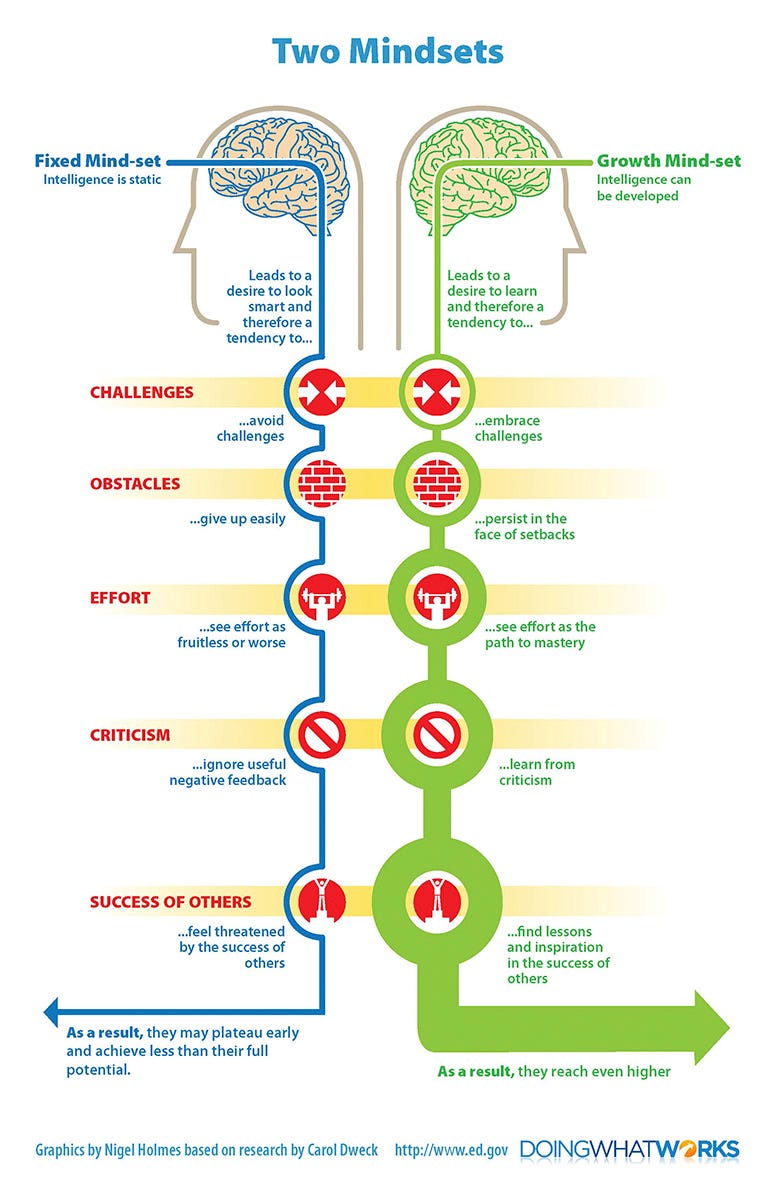Kids these days... cont'd
A closer look at Growth Mindset
I want to start by thanking you all for your feedback from the last post. It appeared that the topic resonated with many of you – and so, I’d like to take a deeper a dive at the recommendations given.
One of trends seen with coaching Gen Z athletes was that they lacked the ability to handle adversity. To combat this, the team of researchers suggested developing a growth mindset amongst your team.
So, for this week’s 3 Point’s, we’ll take a closer look at Growth Mindset. I’d like to clarify what Growth Mindset is, what it isn’t, and a framework for how to develop it with your team.
1. So what is Growth Mindset? Growth Mindset was coined by Dr. Carol Dweck, a Stanford professor who wanted to understand, “What makes a really capable child give up in the face of failure, where other children may be motivated by the failure?” She eventually found that two beliefs existed about one’s own traits and abilities, and that these beliefs shape how people approach challenges and setbacks.
“In a growth mindset, people believe that their most basic abilities can be developed through dedication and hard work—brains and talent are just the starting point. This view creates a love of learning and a resilience that is essential for great accomplishment.” (Dweck, 2015)
“In a fixed mindset, people believe their basic qualities, like their intelligence or talent, are simply fixed traits. They spend their time documenting their intelligence or talent instead of developing them. They also believe that talent alone creates success—without effort.” (Dweck, 2015)
2. Dweck’s work has become incredibly popular. And rightfully so. It’s become a cultural buzzword in workplaces and high performing teams. As a result, it’s widely mis-used. So much so, Dweck’s team has dubbed the term False Growth Mindset. Here are two of the common misconceptions that lead to a False Growth Mindset:
You either have a Growth Mindset or you don’t. We all have a mix of growth and fixed mindsets. For example, I just went skiing for the first time and it was easy for me to approach it with a growth mindset - Having never done it, I was not inclined to think I was a born a skier, I knew it would challenge me, but it looked fun and I wanted to spend time improving at it. Falling didn’t feel like a representation of my innate ability, but a necessary part of the process toward improvement. It can be easier to slide into a fixed mindset in endeavors we care deeply about. As a basketball player, a bad game, negative feedback, or comparison to another player often left me feeling exposed. I felt inclined to shy away from challenges in fear of greater exposure. So it’s important to understand we have fixed mindset triggers and becoming more aware of them and understanding them allows us to stay in a growth mindset more often.
Praise the effort, not the outcome. According to Dweck, this is wrong. Instead, praise the effort that led to the outcome or learning progress. Praising unproductive effort, serves as a consolation prize and it indicates that we don’t think that the athlete can do better. As Dweck puts it, “this kind of growth mindset idea was misappropriated to try to make kids feel good when they were not achieving... When you focus on effort, [you have to] show how effort created learning progress or success.” We want our athletes to know that if they are stuck, they can’t just rely on more effort but need to re-strategize to get unstuck.
3. Using Dr. Rick McGuire’s Construction Model to develop and nurture a growth mindset with your team (I added a few ideas of my own to get the ball rolling):
What will I generally do in practice to develop and nurture a growth mindset?
Process praise > Person praise
Player A has worked their tail off to become a great shooter > Player A is such a pure shooter
What will I do weekly in practice to develop and nurture a growth mindset?
A weekly film session or post game clips (remember that point about incorporating technology with Gen Z athletes) that highlights improvement, embracing challenge, learning from coaching, and bouncing back.
What will I do daily in practice to develop and nurture a growth mindset?
Add “yet” to my vocabulary: “We’re not a good defensive team… yet”
What will I never do in practice to develop and nurture a growth mindset?
Mistake a “perfect” practice with a productive practice. As Dweck puts it, “Speed and perfection are the enemy of difficult learning.”


